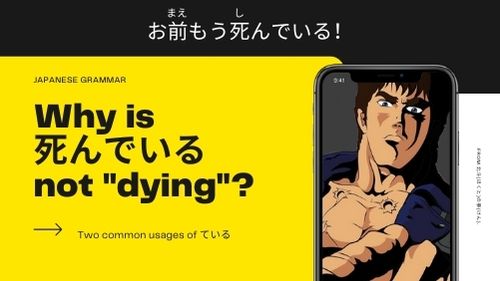
お前はもう死んでいる!
A few years ago, I (Clay) was surprised when my son's friend came up to me and said "Omae wa mou shindeiru!" (Jokingly, of course)
This boy is very smart but… he wasn't studying Japanese. And yet, he was able to spit out a fairly complex -- and weird -- sentence in Japanese. Once he saw my confused (and slightly frightened) face, he quickly explained that it was a internet meme.
A quick web search later, I discovered the line came from a manga/anime called 北斗の拳 (the above video is from this anime).
It may be the only Japanese sentence some people will ever know. But at least it is useful in a fight.
Let's break down the vocabulary.
VOCABULARY
- お前 you [This can be a "fightin' word" or it can be a term of endearment among close friends. Never use this with strangers or those with higher social ranking.]
- は as for (topic marker)
- もう already
- 死んでいる dead [ている form of 死ぬ (to die)]
Okay, but let's get back to the point. Why is 死んでいる not "dying"?
It's the ~ている form which corresponds to the English -ing, right?
Actually, the ~ている form has a few usages:
- to show a progression of something happening or a continual action; -ing progressive form
- to show a state of being that continues to the present
Both usages of ている show a continuation. One is a continuation of action (progressive -ing form) and the other is a continuation of state.
The Progressive Form -ing Meaning
The first meaning is the -ing. Here is an example:
先生は今、話しています。
teacher | as for | now | speaking
The teacher is speaking now.
The State of Being Meaning
Here's an example of the second meaning:
先生は、「明日試験がある」と言っていました。
teacher | as for | tomorrow | test | exists | (quotation marker) | said
The Teacher said that there would be an exam tomorrow.
The 言っていました means the teacher said something and that state (the meaning or content of what was said) is still ongoing. You could just say 言いました here too, but the 「~ていました」 emphasizes that the message continues to be true.
This could also be 言っています (present tense) since the content of the past event continues to the present. This form is often used when reporting quotes in the news. "The prime minister said (is saying)... (a quote that was said previously but the intent behind the quote continues)"
Another example would be the verb 知る (to know). If you know something, you say 知っている. You aren't "knowing" but you "know" - the state of being in knowledge.
Likewise, 結婚している means "(I) am married" rather than "(I) am marrying (now)." The state of being married.
死んでいる means someone or something died and, unless we are in a zombie apocalypse, that state hasn't changed. He/it is still dead -- not deading. The state of being dead.
So, to wrap things up, the meme お前もう死んでいる! should be translated "You are already dead!" rather than "You are already dying!"
Our Top Picks
Are you new to Japanese? Get our beginner's bundle instantly
5/5
Total beginners and "eternal" beginners.
If you have never studied a lick of Japanese, this is for you. If you feel like you are an "eternal beginner," this is for you. If you are studying for the Japanese Language Proficiency Test (JLPT) N5, this bundle is also for you.
Get 13 eBooks and resource packs for one low price and all with sound files. Pay once and get lifetime updates including updates and supplementary material.






